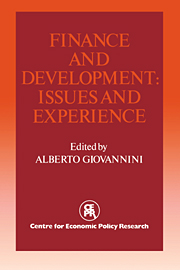Book contents
- Frontmatter
- Contents
- List of figures
- List of tables
- Preface
- List of conference participants
- 1 Introduction
- PART I THE ROLE OF FINANCE IN ECONOMIC DEVELOPMENT
- PART IIA CASE STUDIES – FINANCIAL MARKETS AND ECONOMIC DEVELOPMENT
- 6 The role of finance in economic development in South Korea and Taiwan
- 7 Finance and development: the case of Southern Italy
- PART IIB CASE STUDIES – GOVERNMENT POLICIES
- PART III DEVELOPMENT FINANCE
- Index
6 - The role of finance in economic development in South Korea and Taiwan
Published online by Cambridge University Press: 05 November 2011
- Frontmatter
- Contents
- List of figures
- List of tables
- Preface
- List of conference participants
- 1 Introduction
- PART I THE ROLE OF FINANCE IN ECONOMIC DEVELOPMENT
- PART IIA CASE STUDIES – FINANCIAL MARKETS AND ECONOMIC DEVELOPMENT
- 6 The role of finance in economic development in South Korea and Taiwan
- 7 Finance and development: the case of Southern Italy
- PART IIB CASE STUDIES – GOVERNMENT POLICIES
- PART III DEVELOPMENT FINANCE
- Index
Summary
Introduction
The economic performance of South Korea (Korea henceforth) and Taiwan over the last three decades has been exceptional by any international standard. Building on overpopulated and agriculture-dominated economies belonging to the poorest group of countries in the 1950s, both Korea and Taiwan have succeeded in sustaining rapid growth and industrialization to join the ranks of newly industrialized countries over a period of three decades.
The two countries share a similar Confucian cultural background, in which education is highly valued and obedience to the authorities and frugality are emphasized. They are also poorly endowed in terms of natural resources, making it necessary to trade with other economies. In fact, both Korea and Taiwan stand out as the two most successful cases of economic development and industrialization through the promotion of exports of manufactures.
Because of their colonial heritage and economic dependence on Japan, Korea and Taiwan have developed a financial system that is quite similar to that of Japan in its structure and role, which is bank-oriented, highly regulated, and which was until recently insulated from world financial markets. Joining the worldwide trend of financial liberalization and internationalization in the 1970s, Japan has managed a substantial deregulation and opening up of its financial markets and industries, and Korea and Taiwan have embarked on a similar course of financial adaptation since the early 1980s.
- Type
- Chapter
- Information
- Finance and DevelopmentIssues and Experience, pp. 121 - 157Publisher: Cambridge University PressPrint publication year: 1993
- 5
- Cited by



